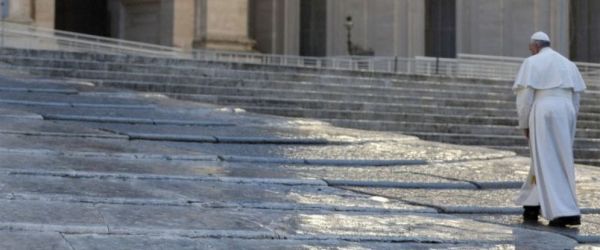Today’s Gospel passage (cf. Lk: 13 22-30) presents Jesus teaching in towns and villages, on his way to Jerusalem where he knows he will die on the Cross for the salvation of us all. In this context, a man asks a question, who addresses him saying: “Lord, will those who are saved be few?” (v. 23). The question had been a source of debate at that time — how many will be saved, how many not ... — and there were several ways to interpret Scriptures on the issue, depending on the texts chosen. Jesus, however, reverses the question — which stresses quantity, that is: “are they few?...” — and instead places the question in the context of responsibility, inviting us to make good use of the present. Indeed, he says: “Strive to enter by the narrow door; for many, I tell you, will seek to enter and will not be able” (v. 24).
With these words, Jesus makes it clear that it is not a matter of numbers, there is no “limited number” in Paradise! Rather, it is a case of taking the right way from now, and this right way is for everyone, but it is narrow. This is the problem. Jesus does not want to give us false hopes by saying: “Yes, do not worry, it is easy, there is a beautiful highway with a large gate at the end ....”. He does not say this. He tells us things as they truly are: the doorway is narrow. In what sense? In the sense that, in order to save oneself, one has to love God and neighbour, and this is uncomfortable! It is a “narrow doorway” because it is demanding. Love is always demanding. It requires commitment, indeed, “effort”, that is, a determined and persevering willingness to live according to the Gospel. Saint Paul calls it “the good fight of the faith” (1 Tim 6:12). It takes a daily, all-day effort to love God and neighbour.
And in order to explain himself better, Jesus tells a parable. There is a householder who represents the Lord. His house symbolizes eternal life, thus salvation. And here the image of the door returns. Jesus says: “When once the householder has risen up and shut the door, you will begin to stand outside and to knock at the door, saying: ‘Lord, open to us’. He will answer you, ‘I do not know where you come from’” (Lk 13: 25). These people will then attempt to claim his acquaintance, reminding the householder: “I ate and drank with you ... I listened to your advice, to your public teaching ...” (cf. 26); “I was there when you held that talk ...” . But the Lord will repeat that he does not know them and he calls them “workers of iniquity”. Here is the problem! The Lord will not recognize us for our claims — “But look, Lord, I used to belong to that association, I was friends with this monsignor, this cardinal, this priest ...”. No, claims do not count, they do not count. The Lord will recognize us only for our humble life and a good life, a life of faith that resulted in good works.
And for us Christians, this means that we are called to establish a true communion with Jesus, praying, going to Church, drawing near to the Sacraments and nourishing ourselves of his Word. This keeps us in the faith, nourishes our hope, rekindles our charity. And thus, with God’s grace, we can and must live our lives for the good of our brothers and sisters, fighting against every kind of evil and injustice.
May the Virgin Mary help us in this. She went through the narrow door that is Jesus. She welcomed him with all her heart and she followed him every day of her life, even when she did not understand, even when a sword pierced her soul. This is why we invoke her as “Mary Gate of Heaven”, a gate that traces the form of Jesus precisely: the door to God’s heart, a demanding heart, but one that is open to us all.
[Pope Francis, Angelus, 25 August 2019]












